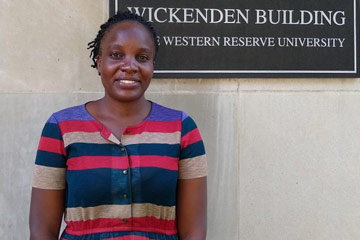
Zoe Sekyonda, a second-year PhD student, enjoys many aspects of her PhD research on improving health care through the study of hemoglobin disorders, but has found the research process itself to be among the most intriguing.
“Having our lab team create an idea from zero and go through all the steps to develop technologies that could be used to save lives truly gives satisfaction,” she said. She hopes to apply the knowledge and skills she has gained from her experience to meet the needs of developing countries in the future.
The youngest of five siblings, Sekyonda was raised in Uganda by a single mother who went to great lengths to secure an education for her children. Sekyonda excelled in her academic pursuits, earning a scholarship for secondary school with the goal of pursuing medical school. Her exam scores fell just short of a government scholarship for Makerere University Medical School, but despite the setback, she still enrolled at the university. There, she discovered biomedical engineering and pursued engineering opportunities, including a project where she worked alongside Duke University students researching Ugandan supply chain logistics of implants.
Inspired by her experiences, Sekyonda changed directions and decided to pursue biomedical engineering.
While at Makerere, she met Andrew Rollins, professor of biomedical engineering and faculty director of the Center for Engineering Action, in the spring of 2019 while he was on a spring break trip in Uganda. That encounter led to an offer for Sekyonda to pursue her PhD in biomedical engineering at CWRU. Umut Gurkan, professor of mechanical and aerospace engineering and research director for the Center for Engineering Action, was eager to offer her a research position after hearing about Sekyonda’s accomplishments as a published researcher and a rising star in the field.
Now at CWRU, Sekyonda’s PhD project seeks to address an unmet need for portable diagnostic tools that allow non-invasive or minimally invasive screening of hemoglobin variants. With an additional focus on translational science, Sekyonda said: “I’ve come to appreciate the importance of translational research in addressing many of the world’s intractable health problems, as well as its ability to promote health.” She believes that with a PhD in hand, her potential to develop life-saving technology would be limitless.
In her free time, Sekyonda pursues her passions for swimming, running, and attempting recipes from various cultures. Even in these hectic circumstances, she finds comfort in CWRU’s diverse community.
“With everything going on in the world, i.e. the pandemic,” she said, “CWRU has made us feel at home even though we are thousands of miles away.”
